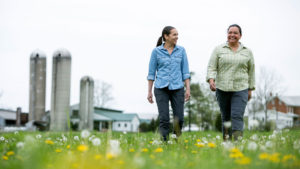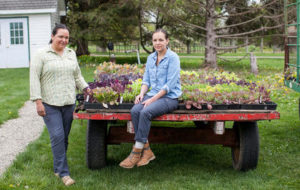Jessika Greendeer has taken her passion for horticulture and turned it into a blessing for the Ho-Chunk people.
Greendeer is the new Agriculture Division manager for the Ho-Chunk Nation, having started as a limited term employee in October, but then was promoted to the full term permanent position in December.
The Ho-Chunk Department of Agriculture was established with an act of the Ho-Chunk Legislature on Oct. 18, 2016, after an establishment resolution by Joyce Warner was introduced at the Sept. 19, 2015, General Council meeting.
Greendeer is from Baraboo, the daughter of Conroy Greendeer Sr., an elder who saw the need of organic gardening in communities. His advice and example were the impetus to her to become more interested in horticulture.

She spent a 10-year stint in the U.S. Army, who served during wartimes in Afghanistan and Iraq, also taking up the journalist trade. Greendeer became involved in the Veteran Farmer Training Program in Pennsylvania and she is a 2016 graduate of the Organic Farming Certificate Program, honored with the Rodale Institute’s Organic Pioneer Award.
She began working with the Ho-Chunk Nation last year, working with organic gardening as an AmeriCorps volunteer.
Now, as she organizes the agriculture program, she develops plans to hire people to work for the division, including fulltime positions, along with temporary workers during the growing season.
One of the first jobs she intends to pursue is to get an organic vegetable farming operation underway, not only to provide horticulture skills to tribal employees, but also to provide healthy diet options for the Ho-Chunk people.
There are 6.5 acres of certified organic land at Whirling Thunder near Tomah, plus acreage elsewhere around the state, owned by the Ho-Chunk Nation.
“The health benefits for eating organic vegetables can be life-changing,” Greendeer said.
The vegetables grown under the program would be distributed to the Head Start facilities and the Tribal Aging Units. By doing so, it would be providing healthy food to children and elders, plus keeping food dollars within the tribe, she said.
Someday the agriculture effort might extend into animals, such as cows, pigs and chickens, but that would be at a future time.
“I don’t like the idea of wasting food,” Greendeer said. “You don’t plant a seed without a plan on what to do with it.”
For now, Greendeer wants to organize things and get programs started.
“In the past, there have been efforts to get an agriculture program started, but this one needs to stick,” she said.
She hopes to get Ho-Chunk members involved in agriculture, something that generations did decades ago.
“We need to get that back. We need people to feel that personal responsibility to grow their own food,” she said. “People don’t need a farm to grow food. They can grow food in their backyards, or even in containers on their windowsills.”

“I feel like in life we’ve been put on a path we’re meant to be on,” Jessika says. She glances at Kristen. Kristen looks back at Jessika. There are no words needed to make it clear that on this point, they agree.
Greendeer previously was involved in e stablishing community gardens within Ho-Chunk communities. Raised gardens are in Sandpillow, Indian Heights and Blue Wing. Another one will be established this year.
“Our fourth garden will be going in at Ho-Chunk Village this spring,” she said. She hopes to maintain a working relationship with Melanie Stacy, who organizes the community gardens, to continue to develop agriculture in the communities and perhaps conduct an additional food survey so she can plan for what types of food the people can use.
Another project she would like to develop is the establishment of a seed bank. The ability to grow indigenous foods could be preserved for future generations and make sure those varieties would always be available. Plus, it would provide an effort to produce more seeds that are in demand and allocate the distribution of those seeds.
“It has to happen,” Greendeer said. “We would provide training for people to become seed keepers or stewards to make sure we are continuing to have viable seeds.”
Not all of the ideas Greendeer is contemplating are new. She will be looking at present indigenous agriculture programs in other Native American nations and use that information to develop her own programs. She knows of an aquaponics program in place with the Oneida nation and can learn from such examples.
“Many people have been asking if we’re ever going to return to raising bison. We’ll get there one day,” she said.